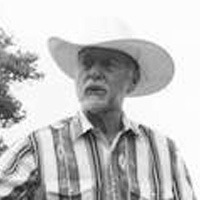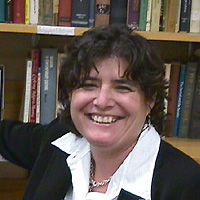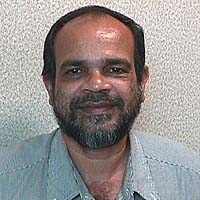 |
Pandu Hegde, October 21, 2004, EESAT |
|
Holmes Rolston, III (Colorado State University), October 11, 2004, EESAT 130, 3: 00 pm - 4: 30 pm Caring For Nature: From fact to value; from respect to reverence Despite the classical prohibition of moving from fact to value, encounter with the biodiversity and plenitude of being in evolutionary natural history moves us to respect life, even to reverence it. Darwinian accounts are value-laden and necessary for understanding life at the same time that Darwinian theory fails to pro- vide sufficient cause for the historically developing di- versity and increasing complexity on Earth. Earth is a providing ground; matter and energy on Earth support life, but distinctive to life is information superintending this matter-energy, coded in the genetic molecules. Life is generated and regenerated in struggle, persists in its perishing. Such life is also a gift; nature is grace. Biologists and theologians join in celebrating and con- serving the genesis on Earth, awed in their encounter with this creativity that characterizes our home planet. Holmes Rolston, III is University Distinguished Professor and Professor of Philosophy at Colorado State University, is often called "the father of environmental ethics" as an academic discipline. He was recently featured in Fifty Key Thinkers on the Environment (Joy A. Palmer, ed., Routledge). Rolston has written seven books, most recently Genes, Genesis and God (Cambridge University Press), Philosophy Gone Wild (Prometheus Books), Environmental Ethics (Temple University Press), Science and Religion: A Critical Survey (Random House, McGraw Hill, Harcourt-Brace), and Conserving Natural Value (Columbia University Press). He gave the Gifford Lectures, University of Edinburgh, 1997-1998. In 2003 he was awarded the Templeton Prize in Religion, awarded by Prince Philip in Buckingham Palace and in amount about $ 1.3 million dollars, larger than a Nobel Prize. Advocating environmental ethics, he has lectured on all seven continents, and is past president of the International Society for Environmental Ethics. |
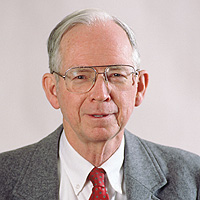 |
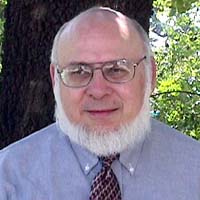 |
Glenn Graber (University of Tennessee), September 13, 2004, EESAT 130, 3: 30 pm - 5:00 pm The Rights and Wrongs of Human Cloning Both sides of the debate about cloning offer absolute answers. Graber explores the gray domain between the two sides in this complex issue through the use of hypothetical scenarios and sorts out what about human cloning might be ethically acceptable and what might not be. Graber is a Professor of Philosophy at the University of Tennessee, Knox- ville where he has taught since 1968. He is also a professor in the Department of Medicine in the University of Tennessee Medical Center at Knoxville, where he is involved in clinical teaching and consultation. He is author, co-author, or co-editor of 6 books, more than 40 articles, and 5 multi-media programs, dealing with a variety of topics in ethical theory, religious ethics, medical ethics, and professional ethics. |
|
Alan Carter (University of Colorado), April 30, 2004, EESAT 130, 3: 00 pm - 4: 30 pm Biodiversity and All that Jazz Carter considers several of the most famous arguments for our being under a moral obligation to preserve species, and finds them all wanting. The most promising argument for preserving all varieties of species might seem to be an aesthetic one. Unfortunately, the suggestion that the moral basis for the preservation of species should be construed as similar to the moral basis for the preservation of a work of art seems to presume (what are now widely regarded as) erroneous conceptualizations of "species." The more promising approaches to how "species" ought to be conceptualized suggest that the preservation of species should be construed as of far greater aesthetic importance than is suggested by focusing upon the preservation of any single work of art. Hence, if we have a moral obligation to preserve a single artwork, then we have a far greater moral obligation to preserve species than has often been presumed. Alan Carter is Professor of Philosophy and Environmen- tal Studies at the University of Colorado at Boulder. He was formerly Chair of the Philosophy Department at Heythrop College, University of London. His most recent book is entitled A Radical Green Political Theory. |
 |
 |
Victoria Harrison Carter (University of Colorado), April 30, 2004, EESAT 110, 2: 00 pm Internal Realism and Religious Plurality When Hilary Putnam's theory of internal realism is applied to the issue of religious plurality, the result--"internalist pluralism"--constitutes a paradigm shift within the phi- losophy of religion. Internalist pluralism succeeds in avoiding the major difficulties faced by John Hick's famous theory of religious pluralism, which views God, or "the Real," as the noumenon lying behind diverse religious phenomena. In sidestepping the difficulties besetting Hick's revolutionary Kantian approach, internalist pluralism thereby provides a solution to significant theoretical problems, while doing so in a manner that is respectful of cultural diversity and religious sensitivities. Victoria Harrison-Carter has been a member of the Department of Philosophy at the University of Colorado at Boulder since Fall 2001. Previously she taught Philosophy and Religious Studies at Birkbeck College, University of London. Her research interests span the interface of Philosophy of Religion, Metaphysics, and Epistemology. Her research monograph, The Apologetic Value of Human Holiness, was published by Kluwer in 2000. |
|
Louke van Wensveen (Independent Scholar), April 26, 2004, EESAT 125, 3: 00 pm - 4: 30 pm Dirty Virtues: Human Character and the Environment "Virtues are biologically based, conditioned feedback loops that allow human beings to live well within their natural environment: to flourish and let flourish. At the intersection between the 'inner' and 'outer' worlds of a person, virtues ensure fitting personal adjustments in response to inter- nal and environmental features and changes. They are truly powers, to cite the ancients. Honed by both evolutionary and cultural histories, vir- tues offer hope for an ecologically rich future." --Louke van Wensveen Having traced developments in environ- mental virtue ethics from its emergence two decades ago, Louke van Wensveen turns to an account of its nature and significance, drawing on both ecology and neuroscience. Louke van Wensveen is an independent scholar and ethics consultant, based in Los Angeles. A native of the Netherlands, she studied comparative religion and social ethics at Leiden, Harvard, and Princeton Theological Seminary. Dr. van Wensveen publishes and consults in the areas of environmental ethics and business ethics. She is the author of Dirty Virtues, which chronicles the character traits that inspire people to build sustainable communities. Since 1998, she has participated in the Ethics and Sustainability Dialogue Group, an unprecedented exchange between ethicists and members of the Chlorine Chemistry Council. She also serves as an independent advisor on Dow's Corporate Environmental Advisory Council. Until 2002, Dr. van Wensveen was Associate Professor of Theological Studies at Loyola Marymount University in Los Angeles. Her course "Science, Theology, and |
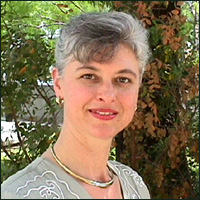 |
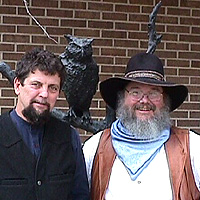 |
Gary Nabhan and Tony Norris (Northern Arizona University), March 12, 2004, EESAT 130, 3: 00 pm -4: 30 pm Storytelling in Open Lands Protection and Local Food Systems Gary Paul Nabhan, Ph.D. is a literary naturalist, ethnobiologist and sustainable agriculture activist who serves as Director of the Center for Sustainable Environments. His work in biocultural conservation and environmental literature has been honored with the John Burroughs Medal for Nature Writing, a MacArthur Foun- dation "genius" award, a Lannan Literary Fellowship and a Life- time Acheivement award from the Society for Conservation Biol- ogy. He is author of 18 books, including this year's releases of Cross Pollinations: the Marriage of Science and Poetry, and Te- quila! A Cultural and Natural History. He raises Navajo-Churro sheep, heirloom turkeys and native crops near Winona, Arizona. Tony Norris is a storyteller, singer, and rural folklife scholar who serves as Folklorist in Residence at Northern Arizona University's Center for Sustainable Environments. Tony has made field recordings and other documentation of folklife in the Appalachia, Texas and the Intermountain West. He is a regular performer, MC and participant in the National Cowboy Poetry Gathering and other, similar regional events. His Let- ters from Home series of CDs celebrates Western history and rural culture through story and song. He lives in Doney Park near Flagstaff, Arizona. |
|
Sid Goodloe (Carrizo Valley Ranch), March 5, 2004, EESAT 130, 3: 00 pm - 4: 30 pm Watershed Rehabilitation and Management in the Southwest Quoting Chinese emperor Yu Chin from 1600 B.C.: "To protect your rivers, protect your moun- tains." Goodloe demonstrates that ranching and holistic management of watersheds can be compatible. He discusses the qualifications of a good land steward, especially concern- ing water resources and watersheds. He deals with the relationship between water avail- ability and vegetative change and shows how riparian areas cannot be successfully reha- bilitated and maintained without first solving the problems of the watershed. For 48 years, Sid Goodloe has been owner-operator of the Carrizo Valley Ranch, 16 miles North, Capitan, New Mexico. Goodloe's interests range far beyond his own ranch. To name just a few, he is Founder & President of the Southern Rockies Agricultural Land Trust; board member of the Quivira Coalition, a group of ranchers and environmentalists working together for a better environment; he is international livestock consult- ant in Australia, Kenya, Zimbabwe, Brazil, Madagascar, Iran, the Dominican Republic, as well as the Ute Reservation; a mem- ber of the Users Advisory Board to the U. S. Secretary of Agriculture; he is Founding Member of the New Mexico Riparian Council, Member of the National Commission on Wildfire, etc. Because of his contributions he has been the recipient of many awards, such as, the National Cattlemen's Association's Envi- ronmental Stewardship Award, Region 6, in 1995, the New Mexico Watershed Coalition's Watershed Steward Award, 1999, the Lifetime Achievement Award from the New Mexico Riparian Council in 2003. Sid has an M.S. in Range Science and a B.S. in Animal Science both from Texas A & M University. |
|
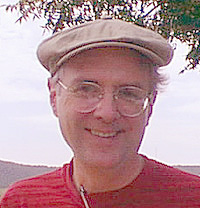 |
Willima Jordan III (New Academy for Nature and Culture), February 27, 2004, EESAT 130, 3: 30 pm - 4: 30 pm Crisis and Creation: The Three Values of Ecological Restoration Reflections on the value of restora- tion as the key to the conservation of natural and historic landscapes, a way of resolving the dilemma of hu- man use, and a context for confronting and coming to terms with some of the most troubling aspects of our relationship with the rest of nature. Jordan is Director of the New Academy for Nature and Culture in Evanston, Illinois. He is a founding member of the Society for Ecological Restoration and the founding editor of Management and Restoration Notes (now Ecological Restoration), the first publication on ecological restoration. He is the author of The Sunflower Forest: Ecological Restoration and the New Communion with Nature, published by University of California Press in 2003. The book is based in part on a year of research in the Department of Philosophy and Religion Studies at UNT, funded by the National Science Foundation. |
|
Victoria Davion (University of Georgia), February 27, 2004, EESAT 125, 2: 00 pm - 3: 30 pm Itch Scratching, Patio Building, and Pesky Flies: Biocentric Individualism Revisted Biocentric individualism, the position that all life has intrinsic value, is of no practical help in policy mak- ing contexts. Examples commonly used in discus- sions of biocentric individualism are themselves alien- ating and threaten to make environmental philoso- phy appear irrelevant to policy decisions. Hence, both biocentric individualism and typical discussions of it are problematic for those wishing to make environ- mental philosophy useful in policy. A recent article by Jason Kawal, in which he attempts to defend bio- centric individualism, demonstrates these points. Davion is a professor of philosophy at the University of Georgia. She is the founding, and current editor of the journal Ethics and the Environment. Her research areas are: ethics, including environmental ethics and feminist ethics, and political philosophy. |
|
 |
Michael Nelson (University of Wisconsin, Stevens Point), February 13, 2004, EESAT 130, 3: 00 pm - 4: 30 pm Are Environmentalists Hypocrites? Ethics, Actions, and the Concept of Hypocrisy Environmentalists are often saddled, and often saddle one an- other, with the charge of hypocrisy. But what is hypocrisy exactly and are those who express environmental concern inevitably hypo- crites? The charge of hypocrisy is commonly employed as a way to silence or discredit a given ethical position. However, the common use of the charge rests upon an exceedingly naïve and inappropri- ate (perhaps even dangerous) understanding of the relationship between ethics and actions. A more sophisticated method of read- ing a person's or a group's ethical commitments is preferred. Such a method would go a long way toward making sense of the charge of hypocrisy, and perhaps other common ethical problems as well. Nelson is as an associate professor of philosophy and of natural resources at the University of Wisconsin-Stevens Point. His research interests in- clude environmental philosophy and ethics, metaethics, and various inter- disciplinary dimensions of environmental thought from literature to ecol- ogy, religion to archaeology. He is coeditor of The Great New Wilderness Debate (University of Georgia Press, 1998) and coauthor of American In- dian Environmental Ethics: An Ojibwa Case Study (Prentice-Hall, 2004), both with J. Baird Callicott. He is currently working on a second volume of The Great New Wilderness Debate, a volume collecting the wilderness writ- ings of Aldo Leopold for Island Press, and a collection of interdisciplinary papers focusing on the thought of Aldo Leopold as applied to aquatic and atmospheric environs to be published by the American Fisheries Society. |
|
Brian Schroeder (Rochester Institute of Technology), February 13, 2004, EESAT 130, 3: 00 pm - 4: 30 pm Politics, the Political, and the Environment Certain currents of recent environmental thinking maintain that contemporary society has reached an impasse: either we begin to rationally construct an ecological society predicated on the primacy of sustainable development, or we abandon ourselves to the present dominant societal model, in which the world's natural resources will be manipulated by an economics dictated by a politics that it increasingly controls, dispensing these resources primarily to the affluent, leaving the rest of the world, human and nonhuman, to fend for itself. What type of communal governance, therefore, should replace the current dominant politico-economic paradigm? Not being merely a matter of constructing an adequate conception of polity, what is also needed is a transformation of our very thinking about community and the Earth. Schroeder is an Associate Professor of Philosophy at the Rochester Institute of Technol- ogy. He was the Fulbright Senior Research Fellow at the University of Turin, Italy for 2000- 01 where he worked on a project to introduce contemporary Italian philosophy to an English speaking audience. Among his publications are Altared Ground: Levinas: History and Vio- lence (Routledge, 1995) and Pensare ambientalista. Tra filosofia e ecologia [Environmental Thinking: Between Philosophy and Ecology] (Paravia Scriptorium, 2000), which he coau- thored with Silvia Benso. His research interests span the areas of contemporary European philosophy, the philosophy of religion, East Asian philosophy, and environmental thinking. |
|
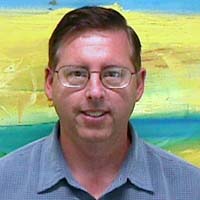 |
Robert Frodeman (University of Colorado), February 6, 2004, EESAT 130, 3: 00 pm - 4: 30 pm The Policy Turn in Environmental Philosophy One of the oldest questions of philosophy concerns what counts as "first philosophy"--which domain of philosophy is the proper place for thinking to begin. This talk revisits the question of philosophic beginnings in order to suggest that environmental philosophy today needs to expand its approach to include a "policy turn" where philosophers be- gin from the projects and perspectives of other academic disciplines, public agencies, and policy makers. This approach will not only increase the relevance of environmental philoso- phy within society; it will also spur new insights within the more theoretical aspects of environmental philosophy. Frodeman is a researcher in the Center for Science and Technology Policy Research at the University of Colorado. He specializes in environmental philosophy and philosophy of science policy. He has held positions at the University of Texas, Colorado School of Mines, and the University of Tennessee, and has consulted for the U.S. Geological Survey. Frodeman is Prin- cipal Director of the New Directions Initiative, editor of Earth Matters: the Earth Sciences, Philosophy, and the Claims of Community (Prentice Hall, 2000), and author of Geo-Logic (SUNY, 2002). He is also Principal Investigator of the NSF-funded Global Climate Change and Society Program, where students explore the nature of scientific knowledge and the contri- bution social scientific and humanistic perspectives play in public policy debates. |


